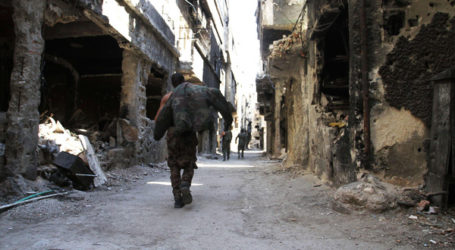SYRIAN WAR CAUSES OIL MARKET JITTER
 Damascus, 8 Sha’ban 1434/17 June 2013 (MINA) – Crude oil prices rebounded to above the $100 per barrel mark last week on concerns the Syrian crises may be entering a new international phase.
Damascus, 8 Sha’ban 1434/17 June 2013 (MINA) – Crude oil prices rebounded to above the $100 per barrel mark last week on concerns the Syrian crises may be entering a new international phase.
Gulfsands Petroleum, one of the last company’s holding on to any sort of hope for Syria, suspended operations there more than a year ago. Syria was never a major factor in terms of global oil supplies, though any new military phase could spark financial concerns for the region, according to a report from oilprice.com monitored by Mi’raj News Agency (MINA).
Crude oil futures last week tipped the $100 per barrel scale following concerns over a possible international military intervention in Syria.
The U.S. Energy Department suspects the Syrian government lost out on close to $3 billion in oil revenue because of civil war. Western opponents of the regime of Syrian President Bashar Assad have eased some restrictions on Syria to allow“oil-related transactions” for the benefit of the Syrian people.
It’s unlikely the Syrian industrial sector is very active, however, suggesting any oil benefits would be miniscule. As of October, the government said around $220 million worth of damage has been caused to energy infrastructure.
Syrian oil production is down more than 50 percent since conflict began in March 2011. The latest assessment of the oil sector said any future exploration in the country is next to impossible until the conflict ends.
The United Nations already said it wants to prop up the peacekeeping force monitoring a cease-fire between Israel and Syria after Austrian forces pulled out because of security concerns. While Turkey is pre-occupied with domestic unrest, it’s made its frustration with the Syrian situation loud and clear.
But Syria is no Libya. One of North Africa’s top oil producers was more or less shut out of the market when NATO forces intervened in response to war crimes allegations against Libya’s Moammar Gadhafi. The International Energy Agency called for the release of strategic petroleum reserves to offset 2011 market disruptions from Libyan civil war.
The IEA explains that hurricanes and disruptions from civil unrest are the primary reasons for strategic oil reserve release. The IEA called for strategic oil reserves in response to the first Iraq War in 1991, Hurricanes Katrina and Rita in 2005 and in response to Libyan disruptions. Any new military phase in the Syrian civil war is likely to have international spillover effects. But for the oil sector, it’s likely just a case of the jitters. (T/P07/E1)
Mi’raj News Agency (MINA)







